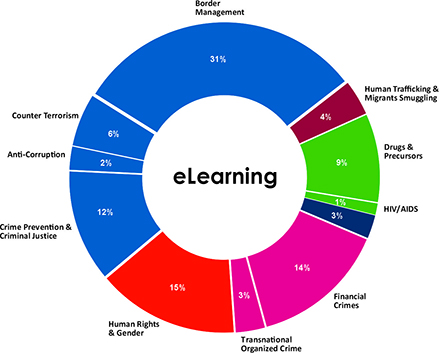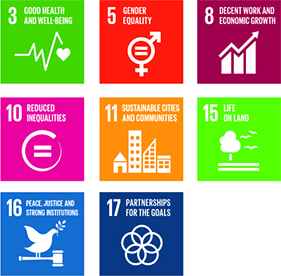
UNODC Global eLearning Programme produces and delivers online training through advanced and innovative technologies to enhance criminal justice practitioners' response to global human security challenges. eLearning programme was first adopted in Pakistan Country Programme-I (2010-15) to undertake an essential task of introducing the global training initiative for law enforcement in Pakistan. The Programme continued to grow and expand its outreach under the second Country Programme for Pakistan (2016-2021) with the establishment of 55 eLearning centres in 20 law enforcement agencies of Pakistan; and delivery of the training contents in English and Urdu, as well as in other native languages of the target audience.
Please download the detailed brochure by clicking HERE
Go to eLearning Global Website
eLearning Programme has been integrated into the broader Pakistan Country Programme's (CP-III) objectives.
The achievements made under the previous phases of the programme implementation demand further expansion of the programme through the setting of result-based objectives as following:


Each eLearning course contains a number of related modules and has its own web-links and resources.
1. Airport Interdiction Techniques and Risk Assessment
2. Anti-Corruption
3. Clandestine Laboratories and Precursor Control
4. Container Profiling and Examination
5. Controlled Deliveries
6. Counter-Terrorism & Violent Extremism
7. Crime Scene Investigation
8. Cybercrime - Digital Evidence
9. Children Associated with Terrorist and Violent Extremist Groups
10. Drug Identification and Testing
11. Essential Services Package for Women and Girls Subject to Violence
12. Firearms Trafficking
13. Gender Issues
14. HIV Service Provision for People Who Inject Drugs
15. HIV/AIDS for Law Enforcement
16. Human Rights
17. Human Trafficking
18. Intelligence Analysis
19. International Narcotics Control Board (INCB) Course
20. Interview and Search of Persons
21. Introduction and Application of Intelligence
22. Investigating Drug Organised Crime
23. Investigating Sexual Exploitation of Children for Frontline Officials
24. Investigating Sexual Exploitation of Children for Specialist Investigators
25. Investigative Interviewing
26. Judicial Ethics
27. Land Border Interdiction Techniques
28. Maritime Crime
29. Money Laundering and Financial Crimes
30. Organized Crime
31. Preventing Violent Extremism through Sport
32. Risk Management
33. Safe Handling and Disposal of Chemicals in Remote Environments
34. Seaport Interdiction Techniques and Risk Assessment
35. Security Document Examination
36. Smuggling of Migrants
37. Strengthening National Evaluation Capacity
38. Prison Management - The Nelson Mandela Rules
39. United Nations Integrity Curriculum
40. Wildlife and Forest Crime